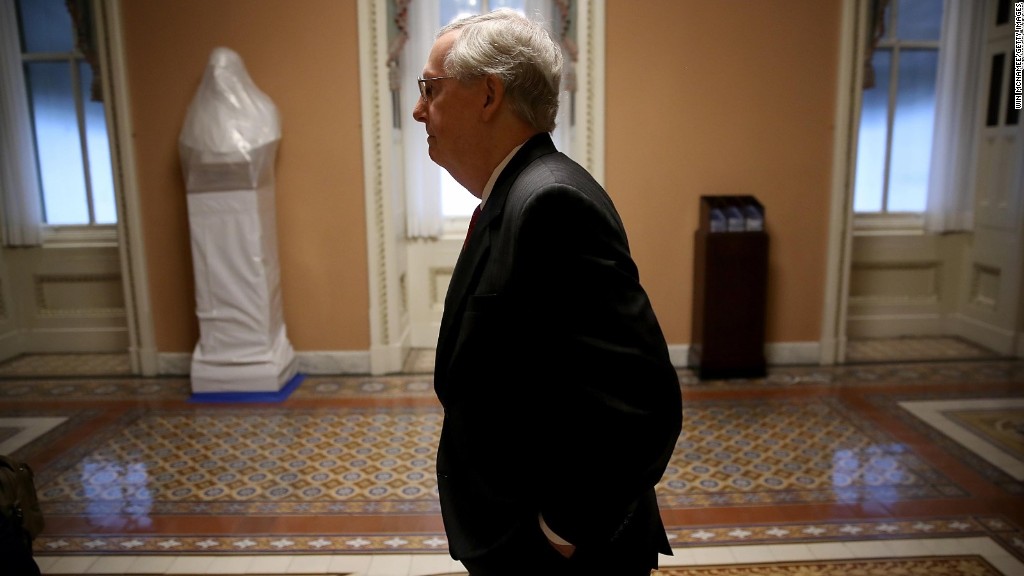
President Trump is taking the future of health insurance into his own hands.
A day after Congress' last-ditch attempt to repeal Obamacare failed, Trump said he may soon sign an executive order on health care that would affect millions of people.
"I'll probably be signing a very major executive order where people can go out, cross state lines, do lots of things and buy their own health care, and that will be probably signed next week," he told reporters Wednesday. "It's being finished now. It's going to cover a lot of territory and a lot of people. Millions of people."
The president has made no secret that he's frustrated with Congress for failing to repeal Obamacare. On Tuesday, Republican leaders in the Senate shelved plans to vote on the latest repeal proposal after it failed to gain enough support.
Related: What happens to Obamacare now?
Instead, Trump now seems to be backing health insurance reforms pushed by Senator Rand Paul of Kentucky. Paul, who opposed the Senate repeal bill, wants insurers to be allowed to sell policies across state lines and for people to be able to form groups to buy coverage.
"I believe President Trump can legalize on his own the ability of individuals to join a group or health association across state lines to buy insurance," Paul said on MSNBC Wednesday. "This would bring enormous leverage to bringing down prices. It would also bring protection to individuals who feel left out, hung out to dry, basically."
The concept of letting insurers sell policies in other states has been very popular among Republicans and much less popular among insurers, state regulators and consumer advocates. The basic idea is that insurers would be able to sell policies in multiple states but only have to adhere to the regulations of their home state. So an insurer from a lightly regulated state, where policies may offer skimpier benefits and lower premiums, could start marketing its plans in a highly regulated state, where premiums tend to be higher.
A handful of states already allow this, but insurers haven't taken them up on the offer. Also, states can form compacts to open their borders, but none have opted to do so.
Supporters argue that selling across state lines would promote competition, increase consumer choice and reduce rates. Residents would have a wider array of plans to choose from that meet their health care needs and budget.
Opponents, however, say that it would split the market so that healthier folks would flock to the skinnier plans, while the sick would stay in the more comprehensive plans, pushing up their rates even more. Or, sicker Americans would flock to the states that require insurers to provide more services, jacking up premiums there.
Also, it can be difficult for insurers to set up provider networks in multiple states.
One thing that makes selling across state lines less attractive is that the Affordable Care Act mandates all insurers nationwide cover an array of benefits. So there are fewer differences between the states these days.
It's questionable whether Trump could just wipe away state insurance rules with the stroke of a pen, experts say. Health insurance is regulated on the state level, according to federal law.
Related: Plan to shut Obamacare site during open enrollment draws critics
The National Association of Insurance Commissioners said it can't comment until it sees the details of the proposed executive order.
"As a general matter, health insurers already have the ability to sell insurance in multiple states as long as they comply with state consumer protection and licensing laws, which many already do," said Mike Consedine, the association's CEO. "The NAIC has long been opposed to any attempt to reduce or preempt state authority or weaken consumer protections."
Paul also supports association health plans which would allow small businesses that belong to a trade or professional association to pool together across state lines and buy health coverage. That would allow them to better leverage discounts and free them from mandates in specific states, he argues.
But similar types of arrangements have run into financial troubles in the past, with many becoming insolvent. Also, association health plans could also fragment the market because it could establish itself in a state with minimal regulations, but sell policies across many states without having to adhere to their rules, according to the American Academy of Actuaries. That would push up premiums in non-association plans.
In addition to the executive order, Trump also promised to return to repealing Obamacare early next year, saying he's "almost certain" Republicans have enough votes. However, he also plans to negotiate with Democrats to "see if I can get a health care plan that's even better."


